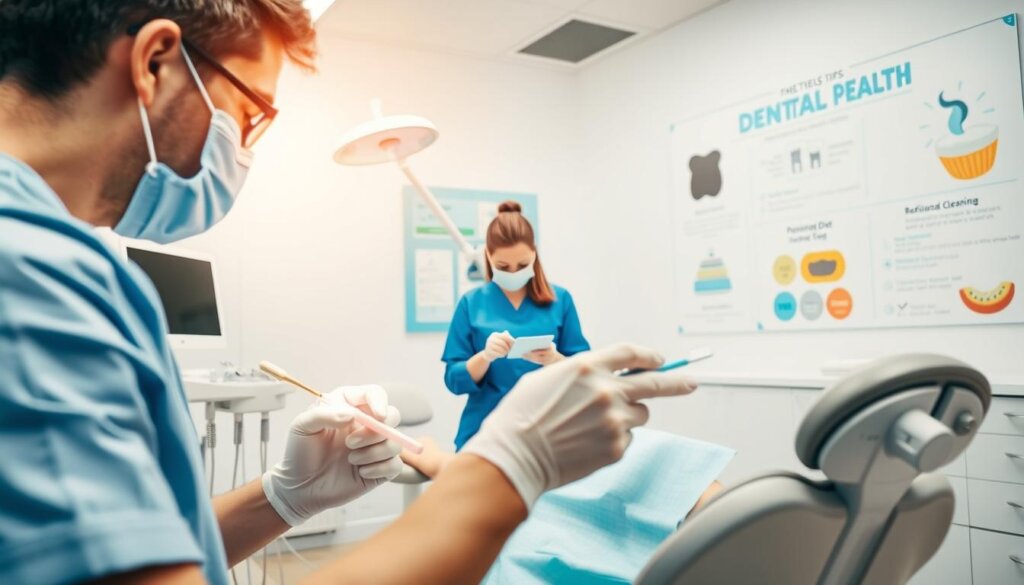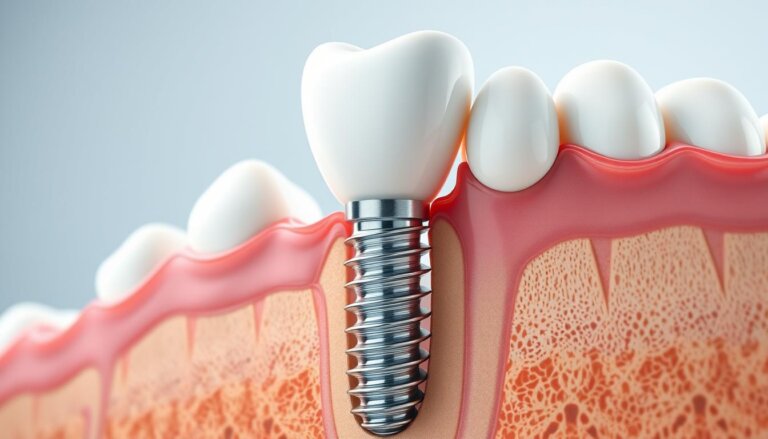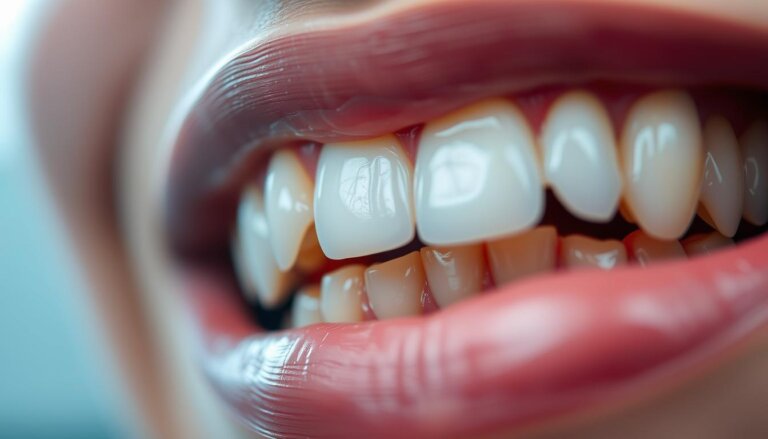Why Are Regular Dental Check-Ups Important If I’m Not Having Any Pain?
Did you know almost 20% of Americans don’t treat their cavities? Many don’t feel pain at first. This fact shows why regular dental visits are key to stopping problems before they start. You might not hurt now, but catching issues early helps avoid bigger, pricier treatments later.
Going to the dentist often is vital for keeping your mouth healthy for years. These visits keep big dental issues at bay. They’re the core of dentistry without discomfort, aiming to stop problems before they make you hurt. This kind of care isn’t just reacting to pain; it’s about stopping it from happening at all.
Key Takeaways
- Preventative care through regular dental check-ups can detect early signs of cavities and other oral issues that are not yet causing pain.
- Pain-free dentistry focuses on minimizing discomfort and anxiety, emphasizing the importance of routine preventative measures.
- Consistent oral health maintenance is integral to avoiding more serious dental problems in the future.
- Regular dental check-ups provide opportunities for professional cleaning and evaluation, which are essential to overall health.
- Embracing the importance of dental check-ups facilitates early intervention, reducing the likelihood of needing emergency dental care.
Understanding Preventive Dental Care
Preventive dental care is key for great dental health and keeping issues like tooth decay and gum disease away. It combines regular dentist visits, good oral hygiene, and smart lifestyle choices. Focusing on tooth decay prevention can greatly cut down serious dental problems and boost overall health.
What is Preventive Care?
Preventive care in dentistry means taking steps early to avoid oral health problems. It includes brushing, flossing, and using fluoride. Also, eating foods good for your teeth and seeing your dentist regularly are key. By getting a dental exam and cleaning every six months, you can catch and fix problems early.
Benefits of Preventive Dentistry
Preventive dentistry has many benefits. First, it greatly lowers the risk of tooth decay, gum disease, and other mouth issues. Using preventive methods means you can avoid serious and expensive dental work later. Plus, it leads to better oral hygiene, a healthier mouth, and a brighter smile.
Regular dental visits are crucial. They not only keep your mouth healthy but also include checks for oral cancer and more. These check-ups catch and manage issues early, preventing major health problems.
The Impact of Oral Health on Overall Health
Oral health and overall wellness are closely linked. Medical research has highlighted the importance of good oral hygiene. It’s crucial for both mouth health and the body’s well-being. Knowing how oral health affects other diseases is key to overall health.
Connection Between Oral Health and Systemic Diseases
Many studies show a connection between gum disease and other health problems. These include heart disease, diabetes, and lung infections. This link is mainly due to the inflammation caused by oral bacteria. These bacteria can enter the bloodstream and affect the whole body, making regular dental check-ups essential.
Importance of Oral Bacteria Management
It’s important to control the bacteria in your mouth. Without regular dental visits and good oral care, bacteria can grow. This can lead to gum disease and other serious health issues. Dentists are important for teaching good oral care and offering treatments to control harmful bacteria.
| Systematic Disease Linked to Oral Health | Impact |
|---|---|
| Cardiovascular Disease | Inflammation from oral bacteria can increase the risk of heart disease and stroke. |
| Diabetes | Gum disease can lead to higher blood sugar levels, complicating diabetes management. |
| Respiratory Infections | Bacteria from the mouth can be inhaled into the lungs, potentially causing pneumonia and other respiratory diseases. |
Keeping up with dental check-ups is vital for a healthy lifestyle. Dentists can prevent oral diseases. These efforts also improve overall health.
Early Detection of Dental Problems
Going to the dentist regularly is key for catching dental issues early. These visits help dentists spot small problems before they get worse. This includes tooth decay, gum disease, and early oral cancer signs, which might not be noticeable at first. So, seeing your dentist often can help find these issues early on.
Common Issues Found During Check-Ups
Dentists can find many problems early during check-ups, such as:
- Tooth decay
- Gum disease (gingivitis or periodontitis)
- Minor tooth fractures
- Early signs of oral cancer
- Initial signs of enamel erosion
How Early Detection Saves Money
Finding dental problems early is not just good for your health—it can also save you money. Simple treatments early on usually cost less than more complicated ones later. See how catching issues early can be cheaper:
| Condition | Early Treatment Cost | Late Treatment Cost |
|---|---|---|
| Cavity filling (single, simple) | $50 – $150 | $250 – $1,000 (root canal & restoration) |
| Gum disease management (scaling) | $200 – $300 | $2,000 – $10,000 (advanced periodontitis treatment) |
| Oral cancer screening | Included in check-up | $1,000 – $7,500 (advanced biopsies and treatments) |
Regular dental check-ups can help avoid serious health issues and save you from expensive treatments later.
The Role of Professional Cleanings
Maintaining daily oral hygiene is a must, but professional cleanings play a key role in dental health. These cleanings offer a deep clean that regular brushing and flossing can’t match. They help prevent dental diseases and keep your mouth healthy.
Benefits of Regular Teeth Cleaning
- Preventive Care: Professional cleanings get rid of plaque and tartar. This can stop gum disease and cavities before they start.
- Early Detection: Experts can spot early problems like broken fillings or fractures during these cleanings. This often happens before you feel any pain.
- Aesthetic Improvement: Cleanings can remove stains from food, drinks, or smoking. This can make your smile look better.
Differences Between Home Care and Professional Care
- Tools and Techniques: Dental pros use special tools and techniques for a deeper clean. They can reach spots that are hard to clean at home.
- Customized Advice: They also offer personal tips on how to take care of your teeth better. This advice is customized for each person’s needs.
Professional cleanings are vital for great oral hygiene and dental health. They support your daily oral care routine, ensuring long-term health for your mouth.
Importance of X-Rays in Dental Assessments
X-rays are key in dental exams to keep teeth and gums healthy. They help spot hidden problems in teeth and jawbones. Dentists can find issues early, thanks to X-rays, and take action to prevent them from getting worse.
Dental X-rays can show many dental issues. From small cavities between teeth to big problems like bone loss or tumors. Knowing about these issues is crucial for dentists to decide how to treat them.
| Aspect Revealed by X-Rays | Impact on Dental Health Assessment |
|---|---|
| Early-stage cavities | Intervene before substantial damage occurs |
| Jawbone abnormalities | Evaluation of underlying bone structure for orthodontic treatment |
| Root positions | Essential for assessing the need for extractions or other surgeries |
| Impacted teeth | Crucial for surgical planning and preventing potential alignment issues |
The need for X-ray checks varies by patient. It depends on age, dental health, and history of dental problems. Dentists adjust X-ray frequency for each patient. They use the latest X-ray tech to lower risks and improve dental health.
Identifying Risk Factors for Cavities and Gum Disease
Dental check-ups are key for finding risks that lead to cavities and gum disease. Understanding these risks helps dentists create better care plans. This can greatly improve how we prevent tooth decay and take care of our oral health.
To fight dental problems, knowing the common risk factors is critical. These include genetics, what we eat, and how we clean our teeth. Healthcare pros can then give advice and plans to reduce these dental risks.
Common Risk Factors
- Poor dietary choices high in sugary foods and drinks
- Inadequate oral hygiene routines
- Genetic susceptibility to dental diseases
- Irregular dental check-ups
Tailoring Preventive Strategies
Once we know the risk factors, making preventive care plans is key to keeping our mouths healthy. These plans usually involve:
- Enhanced oral hygiene instruction and practices
- Dietary modifications to reduce sugar intake and acidic foods
- Regular professional cleanings to maintain oral health
- Use of fluoride treatments and dental sealants as preventive measures against tooth decay
With these personalized care techniques, our oral health can get much better. It shows why dental check-ups and changing our daily routines are so important for prevention.
The Consequences of Neglecting Dental Visits
Not going to the dentist regularly is a big mistake. It can badly affect your oral health maintenance and overall health. Knowing the importance of dental check-ups is key to stopping small mouth issues from getting worse. Without a dentist’s regular checks, people risk getting complex dental problems. These can be expensive and hard to treat.
If you ignore your dental health, you might face severe issues. These include gum disease, tooth decay, and losing teeth. Such conditions lead to a lot of pain and trouble speaking or eating. Without treatment, you might need root canals, gum surgery, or tooth removal.
- Potential Long-Term Effects: Dental problems can bring pain and more health issues. They can even be linked to heart disease and diabetes caused by bad oral health.
- How Avoidance Can Lead to Increased Pain: Not going to the dentist can turn small problems big, like cavities or early gum disease. This can lead to a lot of pain and the need for serious treatments.
Seeing the dentist often is important. It helps treat and prevent serious mouth problems. Making importance of dental check-ups a priority keeps your mouth healthy. This avoids the cost and pain of dealing with big dental problems later.
Maintaining Good Oral Hygiene Habits
Dentists play a key role in keeping our smiles bright and our health in check. They teach us how to care for our teeth and gums every day. This helps prevent future problems and keeps us feeling good.
When we listen to dental pros and follow their advice, our teeth get healthier. They tell us how to brush right, floss, and clean between our teeth. This stops lots of dental problems and cuts down on the need for big treatments.
Dentists also make a special care plan just for you. This plan looks at your age, past dental work, and how your teeth are now. It makes sure you get the most out of your dental visits. It also lets you take part in keeping your teeth healthy.
| Component | Description | Benefits |
|---|---|---|
| Regular Dental Check-Ups | Professional examination to identify any early signs of decay or gum disease. | Early detection and treatment of issues, often reducing future complications and costs. |
| Professional Cleaning | Removal of plaque and tartar buildup that regular brushing and flossing might miss. | Prevents gum disease and improves breath. |
| Personalized Dental Advice | Education on specific needs, like care for braces or restoration work. | Empowers better daily care, tailored to individual dental needs. |
Teamwork between dentists and patients is key to fighting tooth problems. It leads to healthy smiles that last a lifetime. Going to the dentist regularly and following their advice are big parts of this. This not only makes our mouths happy but keeps our whole body healthy.
The Psychological Benefits of Regular Dental Visits
Going to the dentist regularly can really make you feel better mentally, especially if you’re nervous about it. Getting to know the mental upsides of regular dental care helps you be healthier about your teeth. It also makes going to the dentist less scary.
One big mental plus is feeling less scared about dental work. Seeing that dental visits can be pain-free changes how scary it seems. Talking to your dentist a lot can make things clearer and less frightening.
Seeing your dentist often also builds trust. This trust makes you feel comfy and helps you talk about teeth worries or what you want. Feeling sure about your dental visits is a big step to better teeth and mind health.
Regular, nice dental visits make you think of taking care of your teeth as normal, not scary. If you were scared before, you might start to feel chill about going. This change is key to making dental care a regular thing, which keeps your teeth healthy without fear.
Nice places and smart staff make dental offices feel welcoming. Dentists who avoid causing you pain not only look after your teeth. They also make sure you’re comfy and mentally okay, which shows they really care all-around.
Highlighting these mental pluses shows how dentists do more than just fix teeth. They aim for total care, making every visit better your teeth and mood. This encourages people to see their dentist more and take charge of their dental health.
Cost of Postponing Dental Care
Putting off dental visits can make treatments more complex and costly. This highlights the importance of dental check-ups. Keeping up with oral health maintenance is crucial for good dental health. It also makes financial sense. We’ll look at how preventive care saves money compared to emergency fixes and the importance of budgeting for dental health.
Comparing Costs: Preventive Care vs. Emergency Care
| Aspect | Preventive Care | Emergency Care |
|---|---|---|
| Initial Cost | Lower | Higher |
| Long-term Savings | Significant | Minimal |
| Health Impact | Prevents major issues | Often too late to prevent damage |
| Frequency of Visits | Regularly scheduled | Unplanned, emergency |
Choosing preventive care keeps your mouth healthy and cuts down on future expenses. Regular visits help avoid the need for costly treatments that come from ignoring dental problems.
Financial Planning for Dental Care
- Set aside a monthly budget for dental visits and cleanings.
- Look into dental insurance plans that cover a lot of preventive care.
- Have some money saved for unexpected dental expenses to keep your budget on track.
Smart financial planning includes regular dental check-ups. Keeping up with your oral health maintenance protects your dental health. It also helps manage costs related to dental care down the road.
How Often Should You See a Dentist?
To keep your mouth healthy, going to the dentist regularly is key. You need these check-ups even if your mouth feels fine. How often you go can really make a difference for your dental health in the long run.
Recommendations by Age and Health Status
Most people should see their dentist twice a year. But, this can change based on how old you are, your overall health, and any dental problems you might have. For example, kids and older people might need to go more often because their teeth can change quickly or they might have common dental problems.
Signs You Need to Visit More Frequently
If you have certain symptoms or issues, you might need to go to the dentist more often. These issues can include:
- Persistent tooth sensitivity or pain
- Bleeding or swollen gums
- Changes in bite or alignment
- Visible decay or damage
Following a visit plan your dentist suggests is key to stop dental diseases. It helps keep you healthy overall, based on what you specifically need for your teeth.
| Age Group | Recommended Visit Frequency |
|---|---|
| Children (Under 12) | Every 6 Months |
| Teenagers | Every 6-12 Months |
| Adults (18-60) | Every 12 Months |
| Seniors (Over 60) | Every 6 Months |
Choosing the Right Dentist for You
When looking for the best oral healthcare, it’s key to choose the right dentist. This choice affects not just the care quality but also how happy you are with the service. Here’s what to keep in mind when picking your dentist.
Looking for Qualifications and Experience
It’s crucial to find a dentist who’s not only qualified but also experienced. A dentist’s education and ongoing learning are important. They help the dentist stay current with dental practices. Plus, experienced dentists are better at solving complex dental problems thanks to their rich history of case management.
- A dentist’s education background — ensure they are accredited by a recognized dental school.
- Professional credentials and licenses — check for membership in reputable dental associations.
- Years of practice — experience often correlates with improved expertise.
- Specialties — consider whether their specializations align with your dental needs.
Importance of Patient Reviews
Patient reviews give vital insights about a dentist’s practice. They cover everything from care standards to the office atmosphere and how friendly the staff is. Good reviews mean the dentist is reliable and focuses on the patient.
- Check online reviews on medical platforms and the dentist’s website.
- Pay attention to comments about the dentist’s communication skills and friendliness.
- Note any testimonials on how effective the treatment was.
- Look at both positive and negative reviews to get the full picture.
Choosing the right dentist is a key step for good oral health. Make this decision by carefully considering their skills, experience, and what their patients say. This ensures you’re comfortable and trust the care you get, which is great for your dental health in the long run.
Conclusion: Prioritize Your Dental Health
Regular dental check-ups are key to great dental health. Dentists can catch problems early, promoting better wellness. This approach prevents pain in the future.
The link between oral health and overall health is strong. Keeping up with dental appointments is a major part of preventing illness.
Regular dental visits play a big role in keeping our mouths healthy. They stop diseases and keep our life quality high. Early problem detection saves money and helps in making plans to avoid tooth and gum issues.
It’s critical to not skip these dental checks. Making them a regular part of your health care means investing in your future. If you’ve missed dental appointments, now’s the time to get back on track. Keeping up with dental care is a step towards better health. Your next step should be visiting your dentist.






